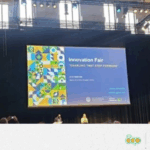- 25/04/2024
- Posted by: Sandra Borma
- Category: News

Successful energy audit leads to cost savings and sustainability for Gambia Horticultural Enterprises
Gambia Horticultural Enterprises (GHE), a leading Gambian company specialising in the export of fresh and processed produce to Europe, recently collaborated with COLEAD through the FFM+ programme on a comprehensive energy audit aimed at optimizing energy efficiency and reducing operational costs. As expenses for electricity and fuel for irrigation and processing activities climbed, GHE sought alternative energy solutions and embraced sustainability initiatives.
Following the results of the sustainability self-assessment system (SAS, COLEAD facilitated an in-depth energy assessment at GHE’s Agro-Food Processing Centre, identifying significant opportunities for efficiency improvements. The audit revealed several Energy Management Opportunities (EMOs), including upgrades to lighting systems, implementation of solar water heating, and the establishment of a corporate energy management policy. Six different EMOs were identified, offering a total annualised savings equivalent to a 36% reduction in energy costs at current prices..
The implementation of these recommendations promises not only significant cost savings but also substantial environmental benefits. Expressing satisfaction with the results, a spokesperson from GHE stated, “Thanks for the comprehensive energy audit report. The Kenyan expert met all our expectations, and we are pleased with the support received.”
This successful audit underscores GHE’s commitment to sustainable operations and efficient resource utilisation. With a focus on implementing energy-saving measures, GHE will enhance its competitiveness while reducing its environmental footprint. This is exactly the essence of the first FFM programme launched in 2016 (and now FFM+) : improving the competitiveness by embracing sustainable practices.
This activity is supported by the Fit For Market Plus (FFM+) programme, implemented by COLEAD within the Framework of Development Cooperation between the Organisation of African, Caribbean and Pacific States (OACPS) and the European Union. This publication receives financial support from the European Union and the OACPS. The content of this publication is the sole responsibility of COLEAD and can in no way be taken to reflect the views of the European Union or the OACPS.





